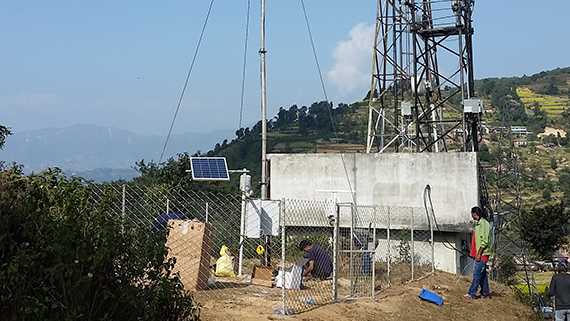Finnish Meteorological Institute launches the third development co-operation project in Nepal

The third development co-operation project of the Finnish Meteorological Institute (FMI) and the Department of Hydrology and Meteorology in Nepal (DHM) funded by the Ministry for Foreign Affairs of Finland was launched in September in Kathmandu. The FNEP3 project covers years 2018–2021. The objective of the project is to improve Nepal's preparedness for natural disasters caused by weather conditions by, for example, developing customer-oriented weather services and personnel competence.
The FNEP3 project funded by the Ministry for Foreign Affairs' Institutional Cooperation Instrument (ICI) continues the work of the FNEP2 and FNEP1 projects which were implemented in 2013–2016 and 2010–2012 respectively.
"It is great that the long-term co-operation between the FMI and the DHM continues. Extensive investments have been made in Nepal's weather services lately, especially in the weather infrastructure. When deploying new sensor instruments and weather forecasting tools and building new weather and climate services, the support provided by a professionally competent and reliable long-term partner is priceless," states Riikka Pusa, Project Manager at the FMI.
The FNEP3 project continues developing the results achieved in the earlier projects and trains personnel in all fields of meteorology. In addition, the project provides support in the deployment of the investments made in connection with a project funded by the World Bank and in creating customer-oriented end products. The project also involves taking Finnish technology to Nepal: Vaisala's weather sensors and a weather camera will be installed.
"Due to the developments achieved in the earlier projects, we are now able to build elements visible to the general public in the FNEP3 project. Within the next three years, the public can expect new weather and climate products published through the DHM's website, for example, better flight weather services and advance warning services tailored to meet the needs on the village level. The village-level warning services are prepared jointly with the Finnish Red Cross and a large Finnish water project," says Riikka Pusa.
Nepal is vulnerable to the effects of the climate change
According to various investigations, Nepal is particularly vulnerable to the effects of the climate change. On average, disasters related to natural phenomena annually take hundreds of lives and the material damages exceed 10 million euros. The adverse effects to the economy and the people caused by the climate change and extreme weather phenomena can be controlled more effectively with high-quality weather and climate services. The results of the socio-economic research conducted in the FNEP1 project clearly state the benefits of the investments: each euro invested in Nepal's weather and climate services produces 6–11 euros to the society's functions through better preparedness achieved through the investment.
The Institutional Cooperation Instrument (ICI) promotes Finnish public operators' direct co-operation with the partner countries' public operators with the objective of improving the know-how of state agencies and institutions in developing countries. The projects focus on taking the solid know-how and good practices of Finnish organisations to the partner countries.
Further information:
Project Manager Riikka Pusa, tel. +358 50 407 3967, riikka.pusa@fmi.fi
